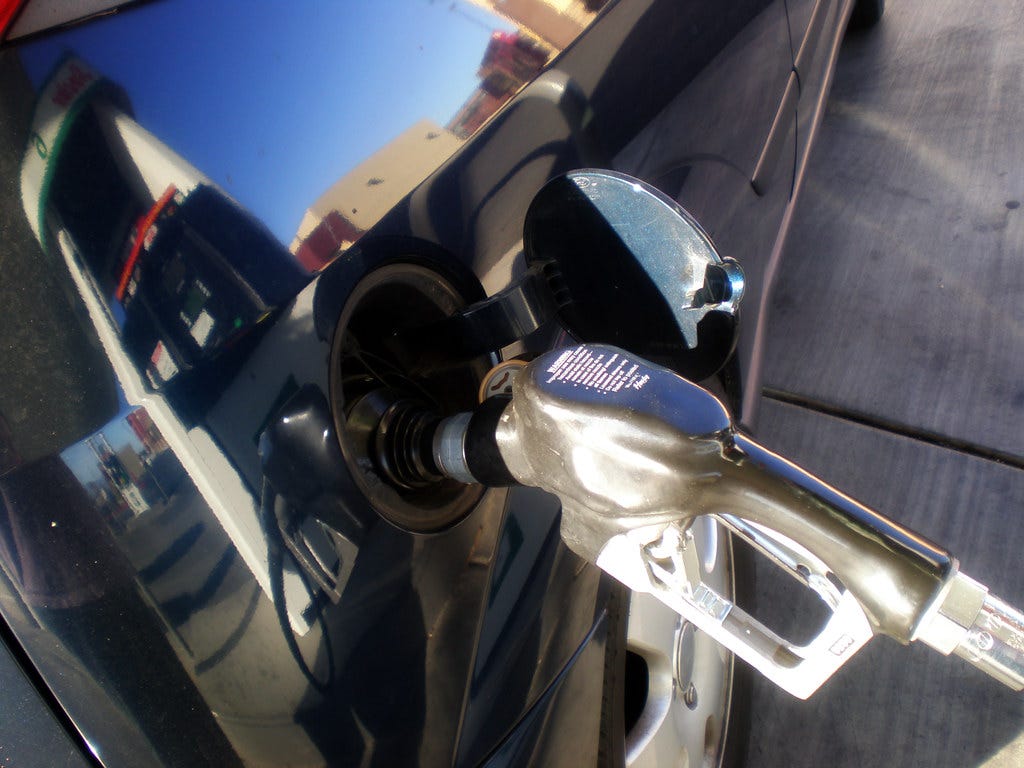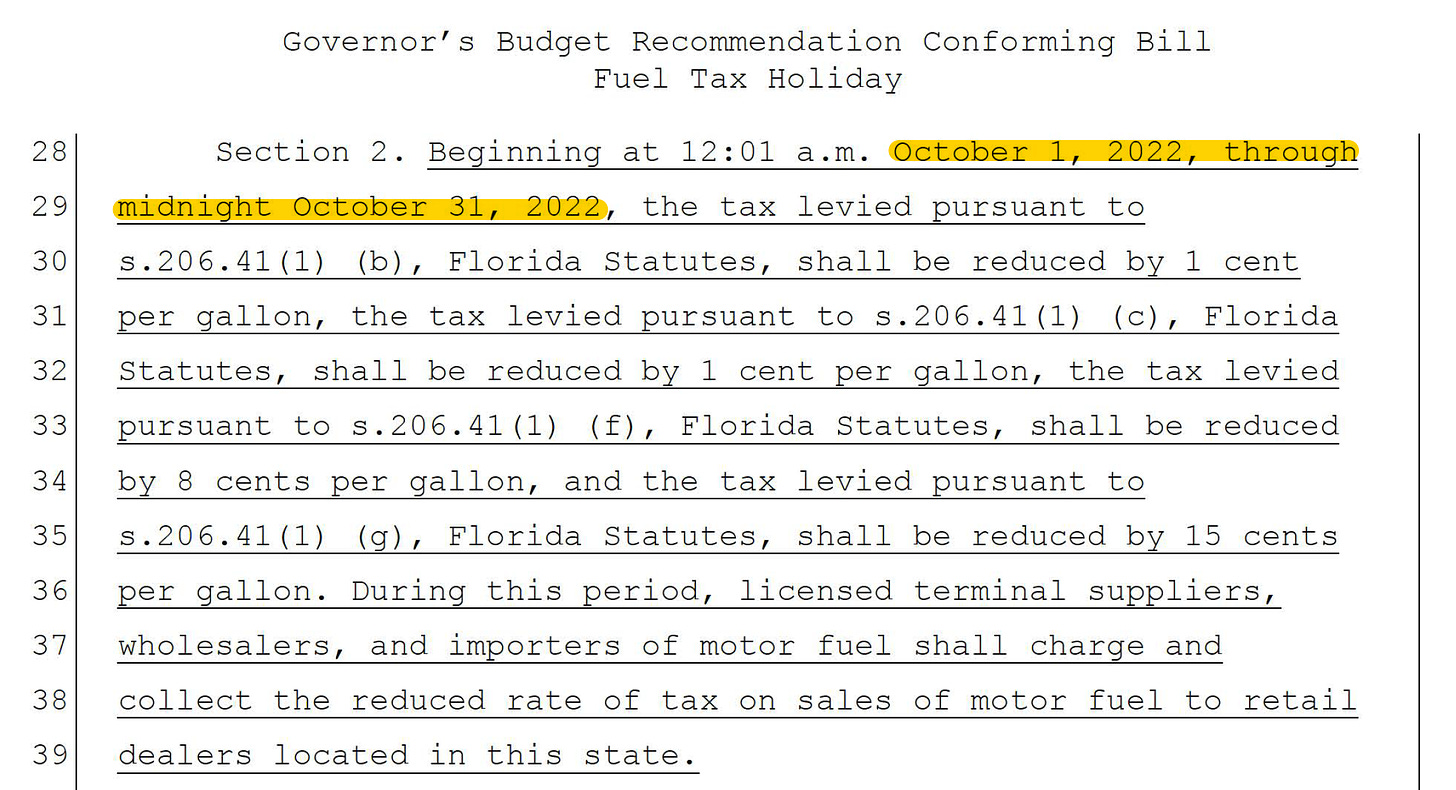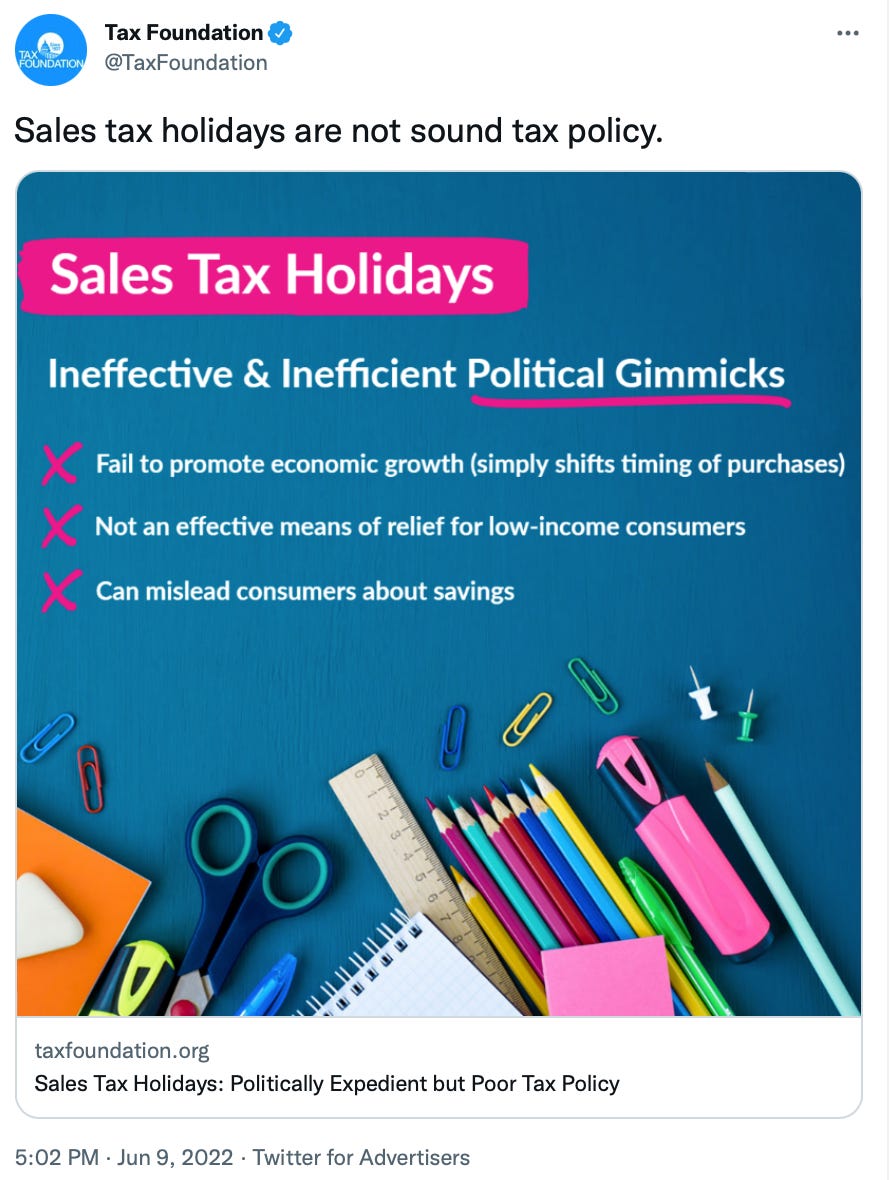Ron DeSantis proposed delaying a tax break for Florida drivers until it was most helpful to his re-election campaign
Floridians are being forced to wait six months before they get a break on gas taxes. Records show Ron DeSantis suggested the idea.

This is Seeking Rents, a newsletter and podcast devoted to producing original journalism — and lifting up the journalism of others — that examines the many ways that businesses influence public policy across Florida, written by Jason Garcia. Seeking Rents is free to all. But please consider a voluntary paid subscription, if you can afford it, to help support our work.
Late last year, with gas prices rapidly rising across the country, Gov. Ron DeSantis promised that help was on the way for Floridians struggling to fill up their tanks.
In a pair of press conferences staged a few days before Thanksgiving, DeSantis announced that he was going to ask the Florida Legislature to cut the state’s gas tax for roughly five months — a 27-cents-a-gallon tax break that DeSantis said would save the average Florida family nearly $200.
“We need to do this relief for people because they’re getting pinched at the pump,” DeSantis told television reporters and others assembled at a Daily’s gas station in Jacksonville.
“Some people said, ‘Why don’t you just do something for a month or two?’” the governor added. “And I was like, ‘No, we’ve got to do it longer than that.’ So this’ll be for many months.”
But just nine days later, emails show that DeSantis actually asked the Legislature to cut the gas tax for just one month — and not to do it until October 2022. That just happens to be the same month that Florida voters will begin heading to the polls in this year’s governor’s race, and when a sudden blitz of news stories about a gas-tax “holiday” would be most politically advantageous to DeSantis’ re-election campaign.

(The emails were first reported by Lawrence Mower of the Tampa Bay Times in a story that you should read right now if you haven’t already — and read again if you have.)
The Republican-controlled Legislature ultimately adopted DeSantis’ idea. Lawmakers approved a one-month, October-only gas-tax holiday just before the end of this year’s legislative session, which concluded in March.
So now Floridians are being forced to wait six months before the state steps in with any help on gas prices...which just hit yet another record high.
Performance art in Tallahassee
It’s easy to forget because so much has happened since, but Ron DeSantis’ public campaign for a giant gas-tax cut was one of the more interesting dramas of this year’s legislative session. And now it looks like it was all just Kabuki theatre.
Let’s turn back the clock for a moment: Going into this year’s legislative session, Ron DeSantis made a roughly five-month gas-tax holiday a centerpiece of his public agenda. He promoted it in press conferences, baked it into his proposed budget, and trumpeted it in his State of the State speech.
But then...lawmakers just seemed to ignore him. Neither the House nor the Senate included any gas-tax holiday at all in early drafts of their own budgets. It became a data point in mid-session stories about tension between the governor and legislative leaders.
When pressed by reporters, both Senate President Wilton Simpson and House Speaker Chris Sprowls cited the same concern: A gas-tax holiday would save too much money for tourists rather than directly for Floridians.
“The reality is, I have a concern about the gas tax as it relates to out-of-state visitors,” Sprowls told reporters about halfway through the two-month session. “I think that our best estimate is hundreds of millions of dollars of that gas tax [break] would go to people who don't live in the state.”
And then, lo and behold, a few days before the end of session and with no prior public debate, the House and Senate suddenly announced a deal: They were going to do a gas-tax holiday, but only for one month and not until October.
Legislative leaders insisted it was their idea and not the governor’s. Senate Budget Chair Kelli Stargel (R-Lakeland) claimed that they chose October because that was one of the two months of the year (along with May) with the fewest tourists. “It had nothing to do with the election,” she said.
Except now we know from public-records that DeSantis’ office suggested the October-only holiday.
What’s more, the entire public premise for this decision — that October is a particularly low month for tourism in Florida — appears to be bunk.
In the Times’ story, Mower reported that Senate officials were unable to provide any evidence to support that claim. But he dug up a lot of data himself, including through subsequent reporting, suggesting that there are several lower-tourism months on the calendar.
One of those months is September, which is, as any reputable calendar will tell you, sooner than October.
But alas, September is not when polls open in the governor’s race.
An odd way to negotiate
For its part, the governor’s office insists that DeSantis wanted a longer gas tax-holiday than the October-only one his administration first proposed to the Legislature.
“In the snapshot of the negotiation process with the legislature that you reference, this is where things might have stood at that moment, but we remained hopeful we could get more in the final legislation,” DeSantis spokesperson Bryan Griffin wrote in an email to Mower (which the governor’s office then sent to Seeking Rents).
And later emails show that DeSantis’ aides did do some work with legislative staffers in January and February on potential five- or six-month gas-tax holidays.
But this is a bit like negotiating to buy a new car by first telling the dealer the maximum price you’re willing to pay. And the governor’s office has declined — despite repeated requests — to answer one very simple question: Why did it suggest an October-only tax holiday in the first place?
This is probably a good spot to note something about short-term tax holidays: They are junk policy. That’s according to tax experts on both the right and the left.
Short-term tax holidays don’t actually save much money for consumers, because retailers raise prices before they begin or do less discounting during them than they otherwise would. And they don’t drive much economic activity, either: A tax holiday might change when people buy, but they don’t really change how much they buy.
These problems are even worse with gas-tax holidays. That’s because the gas tax is opaque (it’s not separated out from the underlying price) and gas prices are volatile (they can change from one day to the next based on world events), so it’s even easier for retailers to pocket the savings themselves. And it’s unlikely that a tax holiday will make people do more driving.
But tax holidays are a great marketing gimmick. Think about all the stories you see on your local TV news at the start of every sales-tax holiday for back-to-school clothes or hurricane supplies. This is why so many elected officials love them.
It’s also instructive to recall the last time Florida held a gas-tax holiday. It was in 2004, and it happened after former House Speaker Johnnie Byrd, a Republican from Plant City, muscled a one-month holiday through the Legislature (with some senators quite literally holding their noses as they voted for it).
Byrd was running for U.S. Senate that year, in a crowded Republican primary where the election was set for Aug. 31.
So you will no doubt be shocked to learn that Florida’s 2004 gas-tax holiday was held in August.
PS: Once you’re done reading Lawrence Mower’s story about this, make sure you go back and read (or re-read) he and Ana Ceballos’ piece from earlier this year about how top officials in DeSantis’ Education Department tried to profiteer off of one of the poorest school districts in the state. It’s one of the best pieces of watchdog journalism in Florida this year. And then check out former Polk County School Board member Billy Townsend’s newsletter “Public Enemy Number 1.” Townsend’s the guy who broke the scandal open.






Well, as a Horologist, October is superior to September to enact a tax relief not because it is related to the election but because it has *one more day in it*.